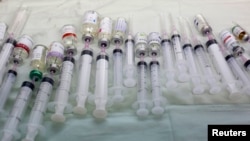In advance of World Hepatitis Day (July 28), the World Health Organization is calling for urgent action to curb millions of infections and deaths from viral hepatitis.
Hepatitis is a viral infection that attacks the liver and can cause acute and chronic disease. It is often called a silent epidemic because the harm it causes tends to be overlooked.
But WHO notes hepatitis is the seventh leading cause of death. It estimates 240 million people are chronically infected with hepatitis B and up to 150 million are infected with the hepatitis C virus. Together, hepatitis B and C account for about 1.5 million deaths every year.
Preventing infection
WHO Global Hepatitis Program team leader Stefan Wiktor says all the tools needed to prevent the infection and deaths are available. He says there is a great vaccine for hepatitis B, good laboratory tests that can screen out infection in the blood supply, and safe injection equipment.
“To prevent death there is treatment," he said. "There is hepatitis treatment for hepatitis B, which can control the disease or suppress the virus, not cure it. Whereas, for hepatitis C. there is now drugs that can cure almost everybody with hepatitis C. That has been the most dramatic development in the last few years, that these new drugs that really transform how we think about hepatitis and it is leading people to start talking about elimination. Elimination of hepatitis as a public health problem in the future.”
The cost of the so-called miracle drugs for Hepatitis C are out of reach for most people around the world. A 12-week course of treatment costs $84,000 in rich countries. But Egypt has successfully negotiated the price down to $900 and the World Health Organization believes prices will continue to fall in coming years.
The hepatitis B virus is transmitted through blood or other bodily fluids. Most infections occur from mother to child. Hepatitis B prevalence is highest in sub-Saharan Africa and East Asia.
The hepatitis C virus is a blood borne virus, which is most commonly transmitted through injecting drug use. WHO Service Delivery and Safety Department Director Edward Kelley says preventing unsafe injections is key to curbing this epidemic.
“Unsafe injections account for 32 percent of hepatitis B infections, about 40 percent of hepatitis C... the most frequent medical procedure in the world today are injections, 16 billion a year and the rate of unsafe injections of those 16 billion, we estimate is about 40 percent,” she said.
The World Health Organization is campaigning for the elimination of unsafe injections by promoting the exclusive use of sterile syringes that are specifically designed to prevent reuse.




